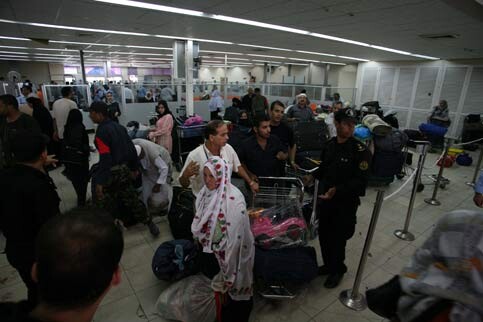Palestinian Center for Human Rights 13 August 2006

Palestinians wheel their luggage on the Palestinian side of the Rafah border crossing, 18 July 2006. (MaanImages/Hatem Omar)
In Response to Statement by EU Observers at Rafah International Crossing Point, PCHR Condemns Re-closure of the Crossing Point after Reopening it for Less Than 7 Hours in Two Days
PCHR condemns the re-closure of Rafah International Crossing Point when the EU observers withdrew from it after it had been opened for less than seven hours in two days for departing travelers. PCHR believes that such repeated behavior is consistent with collective punishment measures taken by IOF against the Palestinian civilian population in the Gaza Strip. PCHR is concerned that this suspicious role may lead to an escalation in violations of Palestinians’ human rights in the Gaza Strip, especially the right to freedom of movement. PCHR additionally demand the EU observers to immediately come back to Rafah International Crossing Point in order for it to be reopened to allow thousands of Palestinian civilians to travel from and to the Gaza Strip. PCHR calls also upon the EU to abstain from any actions that may constitute forms of collective punishment against the civilian population, which constitute a grave breach of international humanitarian law, particularly the 1949 Geneva Convention Relative to the Protection of Civilian Persons in Time of War, to which the EU States are High Contracting Parties.
On Thursday morning, 10 August 2006, Ms. Maria Teleria, Press and Public Information Officer of the EU observers at Rafah International Crossing Point, issued a press release declaring that the crossing point would be opened from 08:30 to 20:00. However, the crossing point was opened at 10:00 and was re-closed at 12:45 as the EU observers withdrew from it. Approximately 1,596 Palestinians were able to travel to Egypt and other countries through the crossing point. On Friday, 11 August 2006, the crossing was opened at 10:00, but it was re-closed at 14:00. Approximately 2,800 Palestinian were able to travel from the Gaza Strip to Egypt and other countries.
The suffering of thousands of Palestinians as a result of the closure of the crossing has continued since 25 June 2006. At least 10,000 people, including hundreds of families who live abroad, have been waiting for the crossing point to be reopened. These families are threatened with losing their residence in countries where they live and work. Hundreds of patients who need medical treatment abroad have not been able to travel. In addition, hundreds of university students who came to the Gaza Strip to spend their vacation are stuck in the Gaza Strip, and other students who wish to register at university abroad have not been able to travel. Additionally, NGOs, who have activities abroad, have had their activities paralyzed. Moreover, thousands of Palestinians have been stuck at the Egyptian side of the crossing point, waiting to be allowed to travel back to the Gaza Strip.
It is worth noting that on Tuesday evening, 15 November 2005, it was announced that the Palestinian National Authority (PNA) and Israel had reached an agreement over the border crossings of the Gaza Strip. Under the agreement, on 25 November 2005, the Rafah International Crossing Point, on the Egyptian border in the south of the Gaza Strip, would be opened for civilian travel to Egypt and the rest of the world. The Palestinians and European Union (EU) observers would run the Palestinian side of the crossing point. In addition, the EU observers would transmit live images to a joint control room several kilometers away.
PCHR has repeatedly expressed concerns over continued IOF control over the movement of Palestinian civilians between the Gaza Strip and the outside world. On 25 November 2005, the crossing point was opened. It was operated smoothly and without any problems. However, the EU observers had since then repeatedly withdrawn from the crossing point as IOF warned them of security threats, which proved untrue.
PCHR condemns the EU observers’ position and calls upon them to come back to Rafah International Crossing Point to carry out their jobs to solve the humanitarian problems resulting from the closure of the crossing point. PCHR further calls upon them to adhere to the timetables of the operation of the crossing point they declared, and to pressure IOF to reopen the crossing point rather than contributing to the collective punishment policies practiced by IOF against the Palestinian civilian population, including transforming the Gaza Strip into a big jail for more than 1.5 million Palestinians.
The Palestinian Centre for Human Rights (PCHR) is an independent legal body based in Gaza City dedicated to protecting human rights, promoting the rule of law and upholding democratic principles in the Occupied Palestinian Territory. It holds Special Consultative Status with the Economic and Social Council (ECOSOC) of the United Nations and is an affiliate of the International Commission of Jurists, the Fédération Internationale des Ligues des Droits de l’Homme (FIDH), and the Euro-Mediterranean Human Rights Network. PCHR is a recipient of the 1996 French Republic Award for Human Rights.